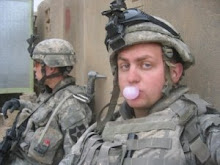This is everywhere, as it should be:
In a story on its Web site, the newspaper known as Stripes said the military violated a congressional mandate of editorial independence by rejecting a request to embed reporter Heath Druzin with the U.S. Army's 1st Cavalry Division, which is attempting to secure the city of Mosul.
Public affairs officer Major Ramona Bellard denied the request of Heath Druzin, a Stripes reporter, to embed in Mosul after "various problems" in his reporting. Major Bellard injected herself into the paper's editorial process after Druzin reported "many Mosul residents would like the American soldiers to leave and hand over security tasks to Iraqi forces," a shocking revelation to a public affairs officer whose only interaction with real Iraqis is probably a visit to her FOB's Pizza Hut.
A spokesman for MND-N pumps up volume:
"U.S. Army units in Iraq remain committed to the media embed program and appreciate objective media reporting," said Lt. Col. David H. Patterson Jr., a spokesman for Multi-National Corps-Iraq. "The relationship that Druzin established with the command during a previous embed did not facilitate being invited back."
Translation? "You didn't pick the stories we wanted. Get lost."
The problem with the whole scenario is the Stars and Stripes is a DOD funded newspaper that retains First Amendment rights. Congress created the newspaper in the 1940s with those guidelines specifically to prevent interference from commanders, the kind interference that we're seeing now. The Army is showing a pretty weak hand with their decision. Their best argument is Druzin didn't purposely seek out a fuzzy, feel good sunshine story. What the good colonel and major fail to realize is that the opinion of Mosul residents is a very important story. Especially on the heels of an Iraqi city pullout that may or may not include Mosul. That the story doesn't sit well with some lite colonel is trivial when considering the men and women on the ground in Mosul. They need to know if there is a certain resentment to their presence, especially in specific neighborhoods, so they can tailor operations to it. Counterinsurgency principles demand acute awareness of surroundings, house to house and sheik to sheik. That includes the amount of gratitude, or resentment, that is in the air.
When I went to DC for the Milblogger's Conference a couple months ago, it included a visit to the Pentagon to meet with public affairs liaisons to trumpet the military's outreach to social networking and new media. They sought to bring down the wall that has traditionally separated the public and the military so a free exchange of information could occur. This whole debacle flies in the face of the hardworking PAOs in the Pentagon trying to coexist with the new and old media. Denying an embed and giving the flimsiest of reasons isn't helping anyone and instead halts the advance of the information warfare front.
UPDATE: Helpful reader LL links to two of Druzin's reports from Mosul. One of them appears to be the offending article. The other is pretty positive. Both are evenhanded and fair. Like I said in the comments section, it's up to MND-N to come up with some compelling evidence beyond "he should have picked better stories."
In a story on its Web site, the newspaper known as Stripes said the military violated a congressional mandate of editorial independence by rejecting a request to embed reporter Heath Druzin with the U.S. Army's 1st Cavalry Division, which is attempting to secure the city of Mosul.
Public affairs officer Major Ramona Bellard denied the request of Heath Druzin, a Stripes reporter, to embed in Mosul after "various problems" in his reporting. Major Bellard injected herself into the paper's editorial process after Druzin reported "many Mosul residents would like the American soldiers to leave and hand over security tasks to Iraqi forces," a shocking revelation to a public affairs officer whose only interaction with real Iraqis is probably a visit to her FOB's Pizza Hut.
A spokesman for MND-N pumps up volume:
"U.S. Army units in Iraq remain committed to the media embed program and appreciate objective media reporting," said Lt. Col. David H. Patterson Jr., a spokesman for Multi-National Corps-Iraq. "The relationship that Druzin established with the command during a previous embed did not facilitate being invited back."
Translation? "You didn't pick the stories we wanted. Get lost."
The problem with the whole scenario is the Stars and Stripes is a DOD funded newspaper that retains First Amendment rights. Congress created the newspaper in the 1940s with those guidelines specifically to prevent interference from commanders, the kind interference that we're seeing now. The Army is showing a pretty weak hand with their decision. Their best argument is Druzin didn't purposely seek out a fuzzy, feel good sunshine story. What the good colonel and major fail to realize is that the opinion of Mosul residents is a very important story. Especially on the heels of an Iraqi city pullout that may or may not include Mosul. That the story doesn't sit well with some lite colonel is trivial when considering the men and women on the ground in Mosul. They need to know if there is a certain resentment to their presence, especially in specific neighborhoods, so they can tailor operations to it. Counterinsurgency principles demand acute awareness of surroundings, house to house and sheik to sheik. That includes the amount of gratitude, or resentment, that is in the air.
When I went to DC for the Milblogger's Conference a couple months ago, it included a visit to the Pentagon to meet with public affairs liaisons to trumpet the military's outreach to social networking and new media. They sought to bring down the wall that has traditionally separated the public and the military so a free exchange of information could occur. This whole debacle flies in the face of the hardworking PAOs in the Pentagon trying to coexist with the new and old media. Denying an embed and giving the flimsiest of reasons isn't helping anyone and instead halts the advance of the information warfare front.
UPDATE: Helpful reader LL links to two of Druzin's reports from Mosul. One of them appears to be the offending article. The other is pretty positive. Both are evenhanded and fair. Like I said in the comments section, it's up to MND-N to come up with some compelling evidence beyond "he should have picked better stories."







9 comments:
I'm of the philosophy that if they offered other Stripes reporters the slots and offered to embed this guy with another unit, it's fair. Really, does the reporter want to be around a bunch of guys who don't like him and may leave his ass hanging in the wind? Personally, I think the Stripes are being a bunch of whiners. From what I understand, units can give the yea or nay to reporters and if THIS unit has an issue with THIS reporter, the Stripes needs to just send a different one. Same story, different writer.
I know what you mean LL, but they might be setting a precedent of kicking out the "problem children." Will this alter the filing of other reporters? If they feel they might be in danger of losing their embed too, you bet. A PAO shouldn't be messing with the editorial process unless violations in OPSEC or gross journalistic violations occur. None of that happened in this case, at least not from what the Army has released.
I read two articles by Druzin on March 8, 2009. They seem very even handed. One focuses more on how the residents of Mosul don't want the troops there, but it is what it is. The other was positive towards US efforts to change standards of living.
But in the end, even if 1st Cav says yes, would Druzin want to go, knowing now that in Mosul, a still-dangerous city, he may be left with no one at his back but his photographer? And would ANYTHING coming from Druzin at this point be fair to the 1st Cav? According to the foxnews article, "The relationship that Druzin established with the command during a previous embed did not facilitate being invited back." (PAO or some such said that) We don't know what happened there, but if the 1st Cav doesn't want him, he needs to go elsewhere.
I suppose that would be his call. I doubt his reputation precedes him on the ground, so I think he'd be safe. I don't think he'd want to drive around with any field grades, though. There aren't many outlets that have an overflowing amount of reporters wanting to cover Mosul, especially with Afghanistan and Iran on the front page. Phasing out one guy is pretty big considering the small amount of embeds in the country. They need to keep him aboard. If any future filings come out that raise questions about his objectivity, that's when it's time to talk about barring him. But he still hasn't done anything wrong, and there's no evidence to support he'd dump his credibility to make 1st Cav look bad. They're already doing a fine job themselves.
Thanks for digging up the links. I agree, he's pretty evenhanded.
Alex (found you from Fark), as a former Army PA NCO and current PA civilian, I understand both sides of this argument. I'm of the impression that Druzin did something more than include text that the Army didn't like. Like you said, normally the Army only restricts people from embedding if they violate the ground rules. But there can be other reasons. If the commanders on the ground don't want the journalist, the PAOs often have to listen to what those commanders are saying. Ultimately it's the commander in the field, not the REMF PAO who is responsible for that journalist.
But yeah, given what we know now, I don't think it was right for the Army to reject his embed request. However, Stripes won't win any litigation. Looking at the history of legal battles fought over similar events, courts (especially the SCOTUS) invariably sides with the military.
A sad day when the military can't stand the sight of it's own BS press coverage.
You seem ready to blame the guys who would be responsible for this peron's life. Maybe the reporter did something that was out of bounds or caused a hazardous situation but the command didn't wish to destroy the embed's credibiltiy and was trying to be nice about it? Just my 2c.
That shouldn't mean the military is free of scrutiny if their secondary job is to keep him safe. I kept my eye on a fair share of reporters in Iraq, and if I had refused to give them water, or told them what pictures to take or not take, I wouldn't be able to use the "I was keeping him safe, sue me!" defense, and rightfully so. The soldiers have a job to do, but so does the reporter. Unless he violates OPSEC or becomes a safety risk, let that man work!
I really doubt the command would go out of their way to shield his credibility, but if they were trying to protect it, not too good of a job so far.
Having read both of Drzin's articles thanks to LL,it really does seem like a stupid move to deny his embed.
Post a Comment